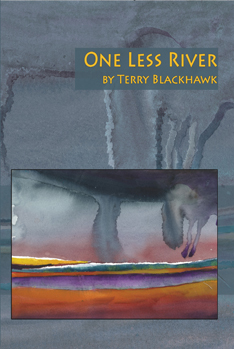KIRKUS REVIEW
TITLE INFORMATION
ONE LESS RIVER
Terry Blackhawk Mayapple Press (64 pp.)
$16.95 paperback, $9.99 e-book
ISBN: 978-1-936419-89-0; July 9, 2019
BOOK REVIEW
Blackhawk (The Whisk and Whir of Wings, 2016, etc.) offers a series of contemplative poems about solitude in nature and crowded city streets.
The poet delicately embroiders themes of separation and retreat into this elegantly conceived collection. The first line of the opening poem, “The Door” asks, “Why is it lately closed to me?” Although this immediately establishes a sense of being shut out, there’s no heavy sense of angst here: “I will not complain. These grasses share the light. / They bend and catch the wind gracefully.” There’s an easiness with this state of separation, in part because it allows the speaker to receive gifts from nature that society can’t provide. The poem ends: “A sauna’s slats, so fragrant, wrap me now. / I’ve crawled into a barrel on the hill.” The speaker enters the sensually evocative interior of the sauna as a hermit crab enters its shell—an image to which Blackhawk returns, later in the collection. The poet is a great observer of nature; in “The Woodcock,” for example, she writes, “I loved the feathers’ / deckled edges and the light weight it made / as I scooped it up and put it, limpsy and weak, / into an old canvas book bag.” This dazzlingly clever image magnifies the bird’s wing by comparing it to the rough-cut page of a book, before the bird itself is slid into a “book bag.” Blackhawk is equally at home playing the flâneuse, observing a city, as in “Noon in a Corner Café: The Sign,” in which the miscellany of urban life parades before her: “cups, traffic, taxis, / mopeds, their signature sounds.” But soon, the hard-edged, concrete metropolis melts into smooth natural imagery that looks beyond city living: “These stones / outlast us, pages / picked up by / the breeze can say almost / anything.” The poet makes her literary influences explicit, referencing Walt Whitman, Emily Dickinson, and others—but although she draws from the American Romantic movement, she shows no need to imitate it.
Refined, learned, and liberating poetry.
– Kirkus Reviews
— ends —

